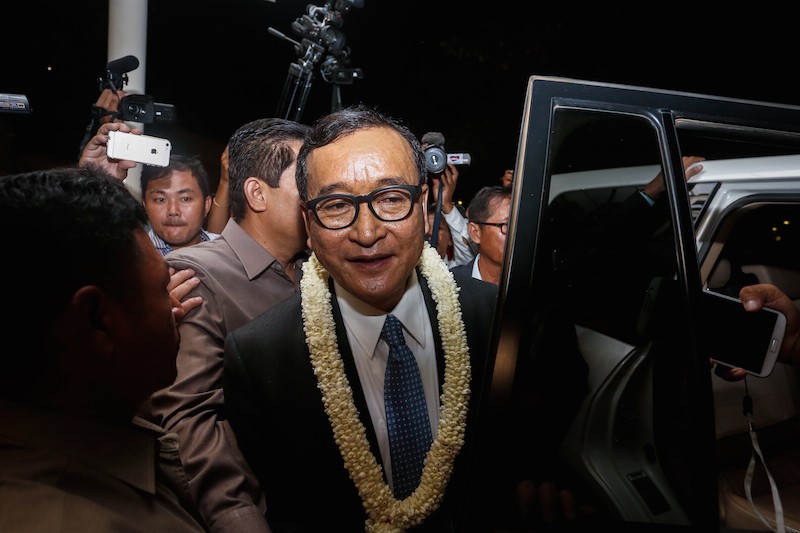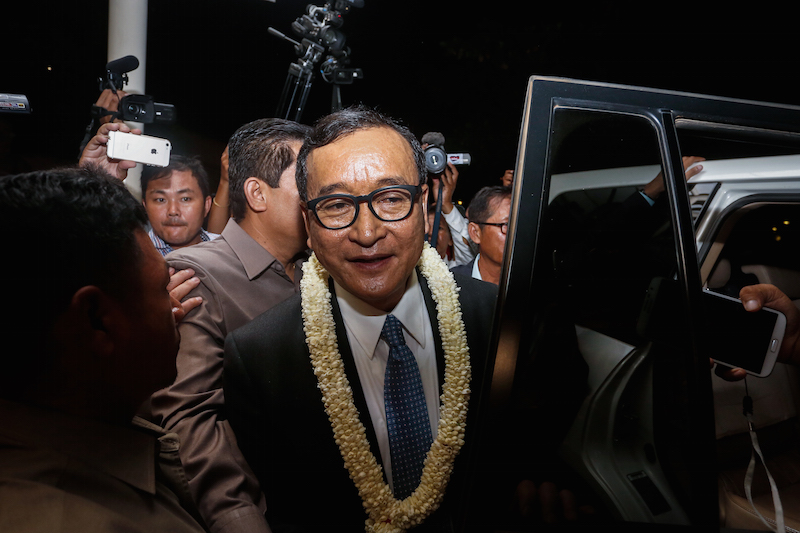Opposition leader Sam Rainsy has officially been exiled from the country in a move that contradicts domestic laws and violates international conventions signed by the Cambodian government.
A government letter ordering officials to prevent Mr. Rainsy from entering the country by land, air or sea was made public over the weekend, with a ruling party spokesman explaining that his return would only bring bloodshed and destruction.

Mr. Rainsy, currently wanted for arrest over a defamation conviction, said that he would still find a way to return to Cambodia before the 2018 national election, while legal experts said there was no basis for the ban in domestic laws, and clear rules against it in international human rights charters.
The order was disseminated in a letter dated October 18 from Sok Phal, chief of the Interior Ministry’s immigration department, and followed a letter from the Council of Ministers a week earlier asking General Phal to prevent Mr. Rainsy from returning by air.
The latest letter tells officials at the country’s three international airports and international border checkpoints to remain vigilant and immediately report any information about Mr. Rainsy returning to the country.
“Also take legal action to stop this individual from coming into Cambodia, taking other action if necessary for serious and highly effective implementation,” it said.
Gen. Phal could not be reached on Sunday. His directive was issued about a week after being instructed by the Council of Ministers to prevent Mr. Rainsy from returning to Cambodia by air.
In that letter, dated October 12, airlines were told not to let Mr. Rainsy board flights to Cambodia; airports were told to send airplanes back to their origin if he was on board; and officials were told to take any necessary measures to get the opposition leader out of the country if he managed to get off a plane.
Since entering self-imposed exile in November to avoid a two-year prison sentence, Mr. Rainsy has promised to return before the July 2018 national election. Last week, he made an offer—called disingenuous by some within his own party—to return immediately and go to jail in exchange for the release of all “political prisoners” in the country.
He said on Sunday that his longer-term plans had not changed.
“Whatever the government decides, I remain determined to come back to Cambodia in one way or another. For the time being, I will not tell how and when I arrive (it could be one year or one month or one week before the next elections). You understand I cannot reveal the details of my plan because this would jeopardize its implementation,” he wrote in an email.
Mr. Rainsy said that if the government truly believed he was a legitimate criminal, they would seek his extradition and imprisonment rather than trying to prevent him from coming back to Cambodia.
“The Hun Sen government’s inconsistency shows that the accusations levied against me as well as my prosecution before, and my conviction by, the Phnom Penh government-controlled court, are phony and ludicrous, being based on purely political reasons,” he said.
Sok Sam Oeun, a prominent human rights attorney, said that preventing Mr. Rainsy from entering Cambodia contradicted domestic laws, including the Constitution.
“According to the law on immigration, the government can do that only for a foreigner,” he said. “In fact, the law on nationality says the government cannot take Cambodian nationality from any Khmer citizen. So I think it is strange.”
“I believe [that] in the Constitution, [citizens] can have the right to travel anywhere,” he said, adding that the directive exiling Mr. Rainsy was not categorically “illegal.”
“Because we cannot say illegal unless the law says it is a crime,” he said.
Andrea Giorgetta, head of the Asia desk at the International Federation for Human Rights, said the ban clearly violated international conventions.
“Of course it is a violation of international civilian and political rights,” he said. “Anyone has a right to leave and reenter his country at any time, so that is definitely a violation of international law that Cambodia has ratified.”
Mr. Giorgetta noted, however, that for Mr. Hun Sen it did not seem to matter.
“He surely doesn’t care. In fact, the violation of their commitments on international laws have been quite normal, especially over the past 18 or 20 months.”
Mr. Hun Sen appeared to be more worried about what would happen if Mr. Rainsy returned—a situation that would force the prime minister to decide whether to arrest his rival and face the ensuing backlash, Mr. Giorgetta said.
“My guess is that they are concerned about Sam Rainsy returning and not being able to handle the situation properly in terms of arresting him, and in terms of preventing Sam Rainsy from getting popular support that at this point the Cambodian government really doesn’t want to see,” he said.
“If he came back and went to prison, he could be a magnet for public protests,” said Carlyle Thayer, a Southeast Asia expert at the Australian Defense Force Academy. “Denying access keeps him abroad, and Hun Sen has a long track record of toying with people who go into exile—this is just a new twist.”
Mr. Thayer said that airlines would almost certainly respect the directive to protect their business interests, while any attempt to cross the border by land could be dangerous.
“Crossing the border has some risk because he could get himself bodily hurt if there is no public presence or press as he comes across, and if he gives notice he would have the regime there to stop him,” he said.
“His return would be for the express purpose of gaining publicity, which is exactly what the regime doesn’t want,” he added.
Ruling party spokesman Sok Eysan declined to comment on the legality of the directives banning Mr. Rainsy’s return.
“I don’t know. Let a legal expert answer that,” Mr. Eysan said, explaining that the ruling party’s priority was maintaining social order and political stability.
“He comes to make trouble such as demonstrations or riots that cause problems, like the loss of people’s lives, the loss of public property and private property,” he said of Mr. Rainsy.
“So the main goal of the party, as well as the government I think, is to ensure peace throughout the country, ensure political stability and secure social safety by not allowing any person or group to cause trouble.”
Mr. Eysan rejected the notion that the CPP was scared of Mr. Rainsy.
“It is not that the government is scared of these one or two people,” he said. “We have to protect in advance, rather than respond, to not allow things to end in a problem.”




